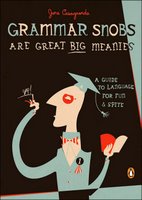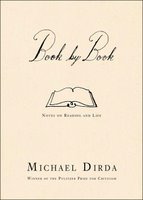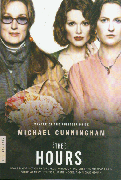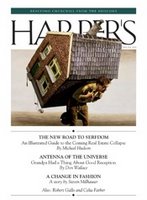Casagrande, June. Grammar Snobs Are Great Big Meanies: A Guide to Language for Fun and Spite. New York: Penguin, 2006.
 Much of what I know on grammar—i.e., those parts of language structures that are distinct from usage and styles—I learned in high-school German. Ours is, as you know, a Germanic language, and while the Germans may throw all their additional verbs in their infinitive forms at the end of a sentence (hence: Es hätte ein bessere Tee werden können = "It [subjunctive form of the verb to have] a better Tea [become] [can]" = It could have been a better tea) much of the structures and cases and tenses operate the same. I learned what the subjunctive case was in German class, though they called it the conjunktive, and this is what made me realize why "If I were a carpenter I'd hammer on my piglet" is, indeed, the correct way to phrase the opening line of verse two of They Might Be Giants' "We Want a Rock".
Much of what I know on grammar—i.e., those parts of language structures that are distinct from usage and styles—I learned in high-school German. Ours is, as you know, a Germanic language, and while the Germans may throw all their additional verbs in their infinitive forms at the end of a sentence (hence: Es hätte ein bessere Tee werden können = "It [subjunctive form of the verb to have] a better Tea [become] [can]" = It could have been a better tea) much of the structures and cases and tenses operate the same. I learned what the subjunctive case was in German class, though they called it the conjunktive, and this is what made me realize why "If I were a carpenter I'd hammer on my piglet" is, indeed, the correct way to phrase the opening line of verse two of They Might Be Giants' "We Want a Rock".At any rate, I didn't start being a dick about grammar until my group of friends all suddenly did, fed, if I can recall, by Alexis (not de Tocqueville) and Shelley (neither Percy nor Mary). This was like 10th/11th grade; we'd all get a superior feeling by catching someone saying "good" instead of "well"—that kind of paltry thing. I think it all led to a blowup of some sort, splintering us into two factions, one that didn't care about proper grammar, and one that cared only about being right all the time.
In college, this abated—or maybe it laid dormant; I'm not sure I know exactly what the difference might be—until I took an introductory journalism class, which required that I buy the AP style manual, a book I pored over and read almost like pornography. I'd never encountered a style manual before, and something about its terse, prescriptive manner—demanding that one write "adviser" and never "advisor," for instance—connected with my admittedly large schoolmarmish side. In just about a year, I became the editor of the Opinions section of the university newspaper, in charge of selecting and printing letters to the editor, among other things, and I lorded the AP stylebook over everyone, to the point where I'd see someone use a serial comma and think them just about the stupidest motherfucker on the planet.*
I had lots of friends, and people enjoyed me.
In time, I read other style manuals, and slowly came to understand the differences among grammar, usage, and style, and I realized the subtle ways that all three work to create and influence meaning. In other words, it stopped being about learning all the rules, and has now become knowing how understanding usage allows me to say exactly what I need to say. And so I don't harp on grammar any more, even though I do like to consider myself a bit of an authority on it among friends and family. A bit of one, I said.
And maybe just among friends. With family, particularly with my sisters, things are a bit different. Because I'm the youngest and because I'm the only boy, I feel as though I'm expected to be a brat, and so with them I play the role happily. We don't email often, the three of us, but when we do and when some error is made (even obvious typos...I'm kind of a dick) I have a good time pointing it out to them, and they have a good time telling me to lighten up and stop being a dick.
All this leads them to consider my grammar snobbery when it comes time to give gifts. So my second birthday present from my sister this year, is the book I'm supposed to be blogging about. Notice I didn't write, "about which I'm supposed to be blogging." It's because I know the never-end-sentences-with-prepositions rule is bullshit, a relic from the forgotten time when people tried to force the rules of English grammar to conform to those of Latin.
Knowing this, Casagrande's book wasn't very informative.** It's great for people who don't own copies of the AP and Chicago style manuals, Strunk & White, Fowler's Modern English Usage, or Erlich's mostly useless The Highly Selective Dictionary for the Extraordinarily Literate (another sister-gift). For those who do, it's a sporadically entertaining airport read. Entertaining yes when Casagrande connects grammar snobbery to conservative punditry (Safire, Buckley) and shows the many ways all these squabblers contradict one another and really have very few answers. Entertaining no when she makes such jokes as:
(I must confess that I had the same goal in mind for this book when I pitched the subtitle Grammar Served with Lots of Sketches of a Nude Homer Simpson, but I got shot down. Lawyers! Michael Jackson, however, did offer to cover my legal bills if I included images of Bart) (191).She's got to be kidding us, right? In a book that consistently portrays copy editors and grammar snobs as a humorless bunch of ninnies, Casagrande's inability to ever be funny (as opposed to the lightly humorous tone she carries throughout) puts her right in the camp she tries so hard to distance herself from.
---
* I now not only adore the serial comma (which is when you drop a comma before the conjunction in a list of items: this, that, and the other), but I also think it's the only way to go if you want to ensure your meaning is clear. I wish I had an example for you, but I'm sure Strunk & White or the Chicago manual have better ones than any I could come up with.+
+ Another thing that blows about this book is that practically all of Casagrande's illustrative examples are culled directly from the texts she openly admits one should turn to for questions, instead of to pop-grammar books like Truss, Safire, et al.** I did learn from this book that "right" and "wrong" are adverbs as well as adjectives (and nouns, too, actually). "Tell me if I use it wrong" and not "Tell me if I use it wrongly." But I learned this in the introduction, about three pages in.






